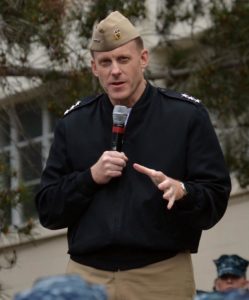Today Secretary of Defense Chuck Hagel announced Navy Vice Adm. Michael S. Rogers as President Obama’s nominee to become commander of U.S. Cyber Command.
United States Cyber Command (USCYBERCOM) is an armed forces sub-unified command subordinate to United States Strategic Command. The command is located in Fort Meade, Maryland and was formerly led by General Keith B. Alexander.
USCYBERCOM centralizes command of cyberspace operations, organizes existing cyber resources and synchronizes defense of U.S. military networks.
In addition, the Secretary announced that he has designated Vice Adm. Rogers to serve as director of the National Security Agency, and chief of the Central Security Service.
The Central Security Service (CSS) provides timely and accurate cryptologic support, knowledge, and assistance to the military cryptologic community.
It promotes full partnership between the NSA and the cryptologic elements of the Armed Forces, and teams with senior military and civilian leaders to address and act on critical military-related issues in support of national and tactical intelligence objectives. CSS coordinates and develops policy and guidance on the Signals Intelligence and Information Assurance missions of NSA/CSS to ensure military integration.
“Vice Adm. Rogers currently serves as the U.S. Fleet Cyber Command commander. If confirmed by the U.S. Senate, he will replace Gen. Keith Alexander, who has served as the NSA director since 2005, and the U.S. Cyber Command commander since 2010. Additionally, the department is announcing that Richard Ledgett has been selected to serve as the NSA deputy director. In his new role as the senior civilian at NSA, Ledgett acts as the agency’s chief operating officer. He replaces J. Chris Inglis, who retired from the position in January”, according to the Pentagon press release (source: DOD Announces Nomination of Cyber Command Commander/ NSA Director http://www.defense.gov/Releases/Release.aspx?ReleaseID=16514).
Rodgers served in the US Navy since graduating from Auburn University in 1981, and was selected for re-designation to cryptology in 1986.
The Obama Administration is set to announce that Admiral Rogers will be the new director of the National Security Agency and the commander of the US’ offensive cyberoperations unit in the Department of Defense. In both of these roles Admiral Rogers will succeed General Keith B. Alexander, who served as the N.S.A. director for nine years before deciding to retire. Before serving as director, Admiral Rogers must be confirmed by the Senate.
His official military biography reads:
Vice Adm. Rogers is a native of Chicago and attended Auburn University, graduating in 1981 and receiving his commission via the Naval Reserve Officers Training Corps. Originally a surface warfare officer (SWO), he was selected for re-designation to cryptology (now Information Warfare) in 1986.
He assumed his present duties as commander, U.S. Fleet Cyber Command/commander, U.S. 10th Fleet in September 2011. Since becoming a flag officer in 2007, Rogers has also been the director for Intelligence for both the Joint Chiefs of Staff and U.S. Pacific Command.
Duties afloat have included service at the unit level as a SWO aboard USSCaron (DD 970); at the strike group level as the senior cryptologist on the staff of Commander, Carrier Group Two/John F. Kennedy Carrier Strike Group; and, at the numbered fleet level on the staff of Commander, U.S. 6th Fleet embarked in USS Lasalle (AGF 3) as the fleet information operations (IO) officer and fleet cryptologist. He has also led cryptologic direct support missions aboard U.S. submarines and surface units in the Arabian Gulf and Mediterranean.
Ashore, Rogers commanded Naval Security Group Activity Winter Harbor, Maine (1998-2000); and, has served at Naval Security Group Department; NAVCOMSTA Rota, Spain; Naval Military Personnel Command; Commander in Chief, U.S. Atlantic Fleet; the Bureau of Personnel as the cryptologic junior officer detailer; and, Commander, Naval Security Group Command as aide and executive assistant (EA) to the commander.
Rogers’ joint service both afloat and ashore has been extensive and, prior to becoming a flag officer, he served at U.S. Atlantic Command, CJTF 120 Operation Support Democracy (Haiti), Joint Force Maritime Component Commander, Europe, and the Joint Staff. His Joint Staff duties (2003-2007) included leadership of the J3 Computer Network Attack/Defense and IO Operations shops, EA to the J3, EA to two Directors of the Joint Staff, special assistant to the Chairman of the Joint Chiefs of Staff, director of the Chairman’s Action Group, and a leader of the JCS Joint Strategic Working Group.
Rogers is a distinguished graduate of the National War College and a graduate of highest distinction from the Naval War College. He is also an Massachusetts Institute of Technology Seminar XXI fellow and holds a Master of Science in National Security Strategy (source: http://www.navy.mil/navydata/bios/navybio.asp?bioID=434).
See related background article: New Trier’s Rogers talks about U.S. Fleet Cyber Command. Read more here:http://www.suntimes.com/photos/galleries/11345589-417/new-triers-rogers-talks-about-us-fleet-cyber-command.html
I should say that some are concerned that nominating one person to head U.S. Cyber Command, the NSA and the Central Security Services concentrates too much power in the hands of one individual. In the event he is ever assassinated or killed by enemy force or terrorists it could throw all three agencies into a leadership crisis.

